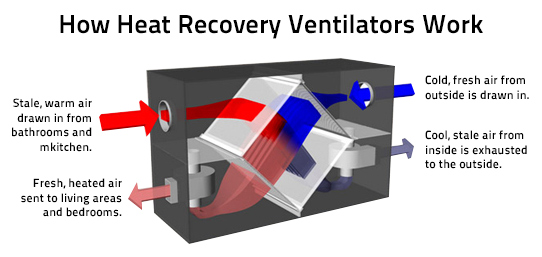7 Clues You Need HRV in Your Home
Exploring the Perks of Heat Recovery Ventilation for Energy Efficiency in Residences
Heat Recovery Ventilation (HRV) systems offer homeowners a practical method to enhancing power effectiveness. By reclaiming warm from outward bound air, these systems can substantially decrease heating and air conditioning costs. Furthermore, they supply a stable supply of fresh air, boosting interior air high quality and comfort levels. As property owners consider lasting alternatives, recognizing the subtleties of HRV systems ends up being significantly important. What variables should one evaluate before making such a financial investment?
Understanding Heat Recovery Ventilation Equipments

Exactly How HRV Improves Indoor Air High Quality

Energy Savings: The Economic Benefits of HRV
Optimizing power effectiveness, heat recovery ventilation (HRV) systems offer substantial economic advantages for house owners. By recovering and reusing warmth from exhaust air, HRVs markedly lower home heating and cooling prices. This technology can result in energy financial savings of up to 30%, depending on climate and usage patterns. Home owners usually observe reduced utility bills soon after installment, making HRVs a financially wise financial investment with time. Additionally, numerous areas offer incentives or refunds for energy-efficient upgrades, better enhancing the financial charm. As energy rates remain to climb, the cost-effectiveness of HRVs ends up being significantly clear. Overall, the unification of HRV systems not only advertises energy performance but additionally adds to long-term financial Get More Info savings for houses.
The Ecological Effect of Heat Recovery Ventilation
A substantial environmental benefit of heat recovery ventilation (HRV) systems hinges on their capacity to decrease total energy intake. By reclaiming warm from exhaust air and moving it to inbound fresh air, HRV systems minimize the requirement for energy-intensive home heating and cooling techniques. This decrease in power demand adds to reduce greenhouse gas exhausts, as much less nonrenewable fuel source is needed to keep comfy interior temperatures. Furthermore, HRV systems enhance interior air top quality by effectively exchanging stale air with fresh outside air, minimizing dependence on mechanical cooling systems that can damage the setting. In general, the application of HRV YOURURL.com systems sustains lasting living methods and aligns with international initiatives to fight environment adjustment by advertising power performance in residential setups.
Choosing the Right HRV System for Your Home
How can property owners ensure they choose the right heat recovery ventilation (HRV) system for their demands? First, they need to assess their home's size and format, as these variables affect air flow requirements. Next, examining the system's efficiency scores is crucial, as higher ratings indicate better efficiency and power cost savings. Property owners should additionally consider installment and maintenance expenses, comparing various brands and models for value. Additionally, it's essential to review sound levels, as some systems run more quietly than others. Consulting with HVAC specialists can offer tailored suggestions based upon certain home problems. Examining user reviews and service warranties can help in making an informed decision, making certain that the chosen HRV system efficiently improves indoor air top quality and energy effectiveness.
Often Asked Inquiries

How Usually Should I Tidy or Preserve My HRV System?
The regularity of cleaning or keeping a warmth recuperation air flow (HRV) system typically depends on use and environmental variables. Typically, it is advisable to perform maintenance every six months to guarantee peak performance and air top quality.

Can HRV Systems Help Decrease Moisture Levels Inside Your Home?
HRV systems can effectively decrease interior moisture degrees by exchanging stagnant, damp air with fresh, drier air from outdoors. HRV Heat Recovery Ventilation. This procedure aids keep a well balanced interior atmosphere, boosting convenience and protecting against moisture-related issues
What Is the Lifespan of a Typical HRV System?
The life expectancy of a normal heat recovery ventilation (HRV) system differs, generally lasting between 10 to 15 years. Normal maintenance can extend its efficiency and operational you could check here life, guaranteeing peak efficiency throughout its use duration.
Exist Any Type Of Noise Worry About HRV Systems?
Noise concerns with HRV systems can arise, especially from follower operation. Many contemporary systems are created to decrease audio degrees, guaranteeing they operate quietly while keeping performance, which addresses possible disturbances in living atmospheres.
Can I Set Up an HRV System Myself, or Do I Required a Specialist?
The individual contemplated whether to set up the heat recovery ventilation (HRV) system directly or work with an expert. Typically, while do it yourself installation is possible, experience assurances correct performance and compliance with regional building ordinance, enhancing system performance.